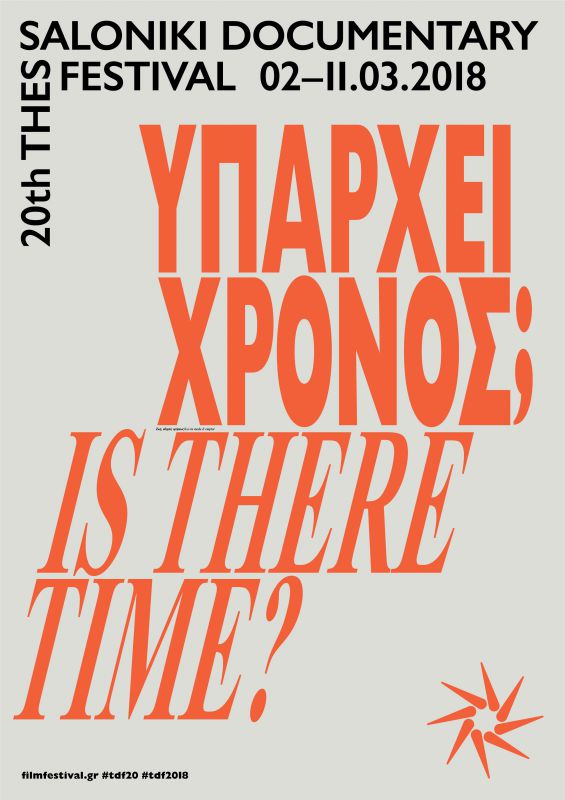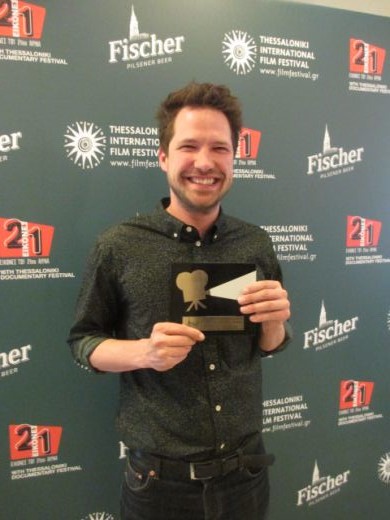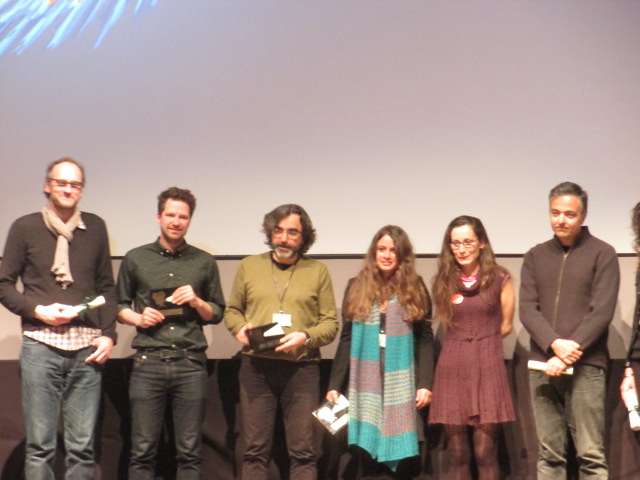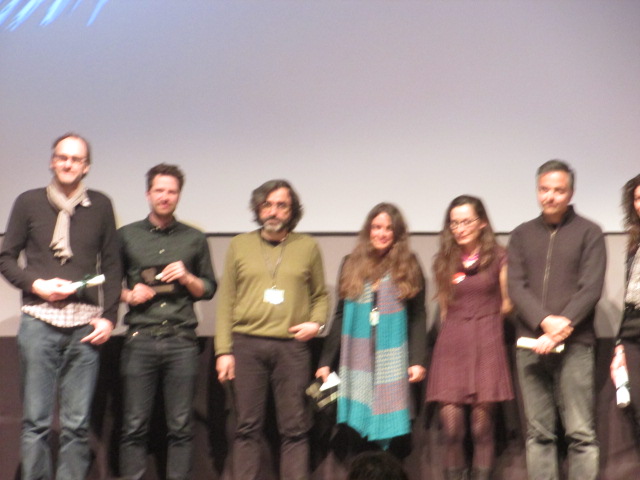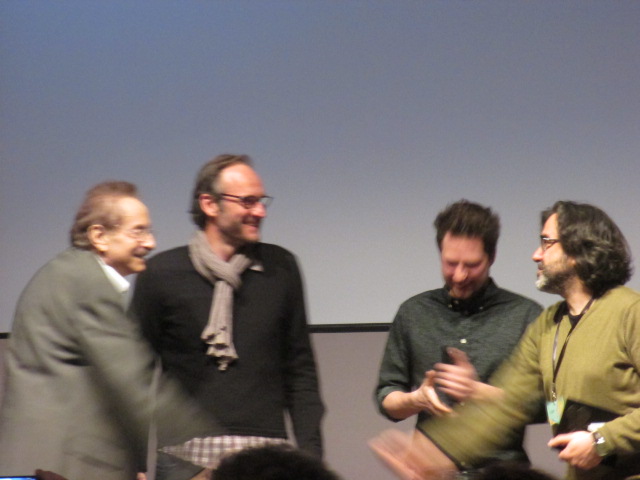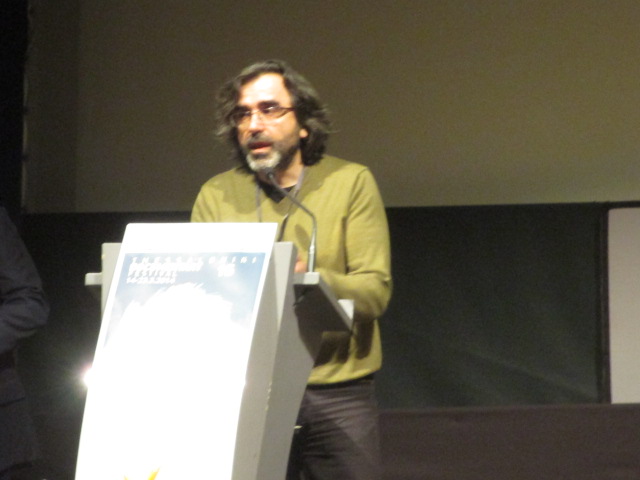|
|
||
|
Pro Tools
FILMFESTIVALS | 24/7 world wide coverageWelcome ! Enjoy the best of both worlds: Film & Festival News, exploring the best of the film festivals community. Launched in 1995, relentlessly connecting films to festivals, documenting and promoting festivals worldwide. Working on an upgrade soon. For collaboration, editorial contributions, or publicity, please send us an email here. User login |
PRESS CONFERENCE WITH ANGELOS ABAZOGLOU at 14th TDF
photo still of MUSTAFA'S SWEET DREAMS (2011)
-14th TDF PRESS- PRESS CONFERENCE WITH ANGELOS ABAZOGLOU
A Press Conference with Angelos Abazoglou was held on Monday, March 11, 2012, in the framework of the 14th Thessaloniki Documentary Festival. This year’s festival carries out a tribute to the French creator with Greek origins, including screenings of several of his films. Mustafa’s Sweet Dreams is Abazoglou’s most recent documentary; it lies closer to fiction and connects the director with his childhood and his father’s origins. “My father was a charismatic man. He was very young when he left Istanbul, moved to USA and at the age of 22 was awarded with a doctorate title. I’ve always lived under his shadow, he always wanted to pass me everything he was. When I was in the first grade of elementary school, I remember he used to wake me up at 5 in the morning to teach me theater, astronomy, physics and more till it was time for me to leave for school. I lost him when I was 14, and at the time I needed to ask him so many things I couldn’t have him by my side. So, I went to Turkey to try to understand the things he carried inside him, how he grew up. There was no other way I could talk to him. Because childhood means sweetness, caramel, pastries, I went to a baklava workshop where 10-year-old children learn their father’s art. I met wonderful people who are not actors, so you cannot tell them ‘repeat what you said’; there was no script, no written dialogue. It was, however, as if they were connected to the camera, especially Mustafa’s uncle”, explained the director. Mustafa’s Sweet Dreams documentary participated in the 2012 Berlin International Film Festival. “The specific festival is far less friendly than the Thessaloniki Documentary Festival, which has a different aura…Here you get the chance to meet 10.000 people. In Berlin, there is a gigantic industry behind it, but you may come across… just yourself and a few journalists. The halls were enormous, 1200 people could fit there and the biggest gift for me was when people didn’t want to leave the Q &A”, stated Mr. Abazoglou. Along with the director, Mustafa, the film’s star, visited Berlin too and it was the first time he ever travelled outside Turkey. As the director said, “he felt like a star, people called his name everywhere”. The audience asked Mr. Abazoglou about the financial crisis and what is his perspective as a Greek of the Diaspora. “What has happened during the past two years, with salaries’ and pension reductions has happened before, in France, in Germany… However, in those countries it took place gradually, over a time period of 20 years, while here, we have it happening in just one or two years, that’s why it feels more violent”, the director answered and added: “The most important thing happening is the state-nation model breakdown. Until now, we had a national family and thought we were able to control our future electing politicians-bad or good is irrelevant. Nowadays, Greece is put in a testing-tube in order to find out a way to break this model down, so that no democratic control can be exercised by us on those who make the decisions. The decisions are made elsewhere, by people with no name, by invisible power centers and politicians are nothing but puppets. Let’s throw stones…to whom? Let’s burn down banks? So what? We already know that decisions are made by others and not by the ones we vote”. In his film Welcome in Greece, Mr. Marshall, the director depicts the attempt to rebuilt Greece, totally torn down after World War II. The director underlined that: “Greece was the country that suffered the worst damages in comparison to any other European country and then a civil war broke up too. Our country was rebuilt in a very strange way, capitalism was built on a very special model here”. As for the present situation, Mr. Abazoglou noticed that we will be able to reorganize “only when we forget the fear inside us. Imagine someone who gets a 500 euro pension being told ‘give us 100 euro’ but not being told and unable to understand the reason. We slip to financial slavery”. Answering the question on the share of responsibility people themselves bear for the situation, the director said: “I don’t want to say we are to blame, I’m not a judge to say who the good guy is and who the bad guy is, to judge and punish, however, things had gone out of control in a way”. He added: “At some point, we lost it, we were amazing and impressive, we won in the European Football Championship, we organized the Olympic Games…it’s nice to feel proud of your country, but we lost sense of any limit and started to lead a life higher than we could afford, with expensive cars, mansions, pools…That, of course, happened after 50 years of misery and the ‘punishment’ goes for the small piece that exceeded the limit. And because no one understands our ‘punishment’, that is the reason we felt terrified, we are afraid of how to survive, how to pay our debts. Once fear gets out of our minds, then we will be able to stand on our feet and find solutions”. The Angelos Abazoglou tribute is co-financed, among other actions of the 14th Thessaloniki Documentary Festival, by the European Union-European Regional Development Fund, in the frame of Regional Operational Programme of Central Macedonia 2007-2013. -14th TDF PRESS RELEASE-
director ANGELOS ABAZOGLOU
17.03.2012 | Thessaloniki's blog Cat. : ANGELOS ABAZOGLOU Basil Zaharoff Berlin Central Macedonia D-Cinema Dimitris Eipides Director Education Education Elementary school Entertainment Entertainment Europe European Union France Geography of Greece Germany Greece Greece Istanbul judge Marshall Marshall , the director Mustafa Person Career PRESS CONFERENCE WITH ANGELOS ABAZOGLOU at 14th TDF Quotation Social Issues Social Issues Technology Technology The 14th Thessaloniki Documentary Festival the 2012 Berlin International Film Festival the Thessaloniki Documentary Festival Thessaloniki Thessaloniki Documentary Festival Turkey War War
|
LinksThe Bulletin Board > The Bulletin Board Blog Following News Interview with EFM (Berlin) Director
Interview with IFTA Chairman (AFM)
Interview with Cannes Marche du Film Director
Filmfestivals.com dailies live coverage from > Live from India
Useful links for the indies: > Big files transfer
+ SUBSCRIBE to the weekly Newsletter Deals+ Special offers and discounts from filmfestivals.com Selected fun offers
> Bonus Casino
User imagesAbout Thessaloniki Mcmahon Vanessa Mcmahon Vanessa Vanessa McMahon Covered the 13th and 14th, and 16th edition. Through its tributes, it focuses both on discovering filmmakers with a unique cinematic point of view, and on the internationally recognized for their contribution to documentary. Contributions from Buno Chatelin http://tdf.filmfestival.gr/default.aspx?lang=en-US&loc=6&page=760 View my profile Send me a message My festivalThe EditorUser contributions |



















